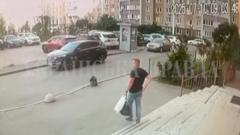As Russia marks the 80th anniversary of its win in World War II, the echoes of past battles resonate in present conflicts. News from Dubna reveals re-enactments of historic events alongside personal stories of families marked by war, illustrating the complex narrative of pride, loss, and an ongoing struggle that defines the nation's identity today.
Russia Commemorates 80 Years of WWII Victory Amid Ongoing Conflict

Russia Commemorates 80 Years of WWII Victory Amid Ongoing Conflict
A nuanced reflection on Russia's celebration of its World War II victory, intertwined with the realities of the current war in Ukraine.
At an event held just outside Moscow, hundreds gather to witness a dramatic re-enactment of the climactic battles from World War II, specifically the Soviet assault on Berlin. The air fills with sounds of simulated gunfire and explosions as actors portraying Red Army soldiers recreate the moment when a swastika was replaced with the Soviet hammer and sickle. This theatrical depiction serves as a tribute to the historic victory known in Russia as The Great Victory, which celebrates the defeat of Nazi Germany.
The anniversary is being observed with significant fervor across Russia, 80 years after the end of a war that cost the Soviet Union dearly, with over 27 million lives lost. Among the onlookers is Katya, whose grandfather was lost to the war. She laments her son’s involvement as a volunteer in the ongoing conflict in Ukraine, expressing her concerns for his safety. The juxtaposition of history with her family's current experiences highlights the heavy burden of history that many Russians still carry.
The context of contemporary warfare looms large, as in 2022 Russia launched an invasion of Ukraine, which the Kremlin insists is a "special military operation" aimed at rescuing it from Western encroachment. Official narratives draw alarming parallels between the current conflict and the historical battles of World War II, fostering a sense of national unity amid turbulent times. Journalists and commentators note that this framing shapes the collective consciousness of the country, as many view the present struggle as a continuation of their fight against fascism.
However, the media's portrayal diverges from historical realities, often neglecting pivotal moments like the 1939 non-aggression pact between the USSR and Nazi Germany. Tentative remarks from various media outlets indicate a cautious approach to historical accuracy, as current state narratives emphasize themes of betrayal by Western nations. The tale of victory is not solely about remembrance but also about showcasing military prowess, illustrated through the grandiose military parades planned in Moscow and depicted in murals and monuments across the country.
As the celebration of the 80th anniversary approaches, symbols of victory permeate the streets. Festivities include decorated rockets and even maternity hospitals dressing newborns in military-themed garb as a nod to shared heritage and ongoing duty. Yet, despite the celebratory atmosphere, many families grapple with memories of loss and the somber reality of warfare.
In conversations with survivors, the emotional weight of war continues to resonate. Fyodor Melnikov, a World War II veteran, fleetingly expresses disdain for the nature of conflict, wishing instead for peace and the freedom to live. His poignant recollections of brotherhood and sacrifice within the traumatic tapestry of war exemplify the lasting pain that transcends generations.
As Russia braced for Victory Day, waves of complex feelings washed over the nation, blending pride in past victories with recognition of the harsh present. The stark realization that victory in history does not guarantee success in current struggles underscores a painful truth for many: the legacy of war is not merely about celebrating the past, but also about understanding and processing its lasting impact in contemporary times.























